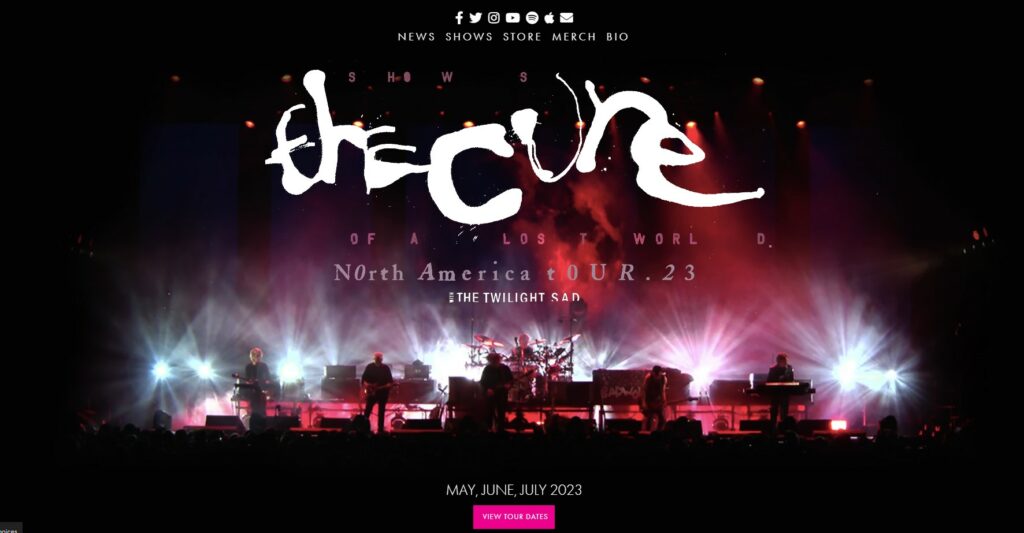Marketing and Promotion in the Music Industry: Having a great song or album won't guarantee sales if you don't have a sound digital marketing strategy for your music. Without a marketing strategy, you will likely struggle to make it as a career musician.
Creating a digital marketing strategy for your music is far from impossible. But it requires dedication and patience. You’ll begin by ensuring you have a professional and widespread online presence. Then you’ll need to build an online community and be consistent when engaging with your audience. Most importantly, you must set measurable goals, analyze at intervals, and adjust your approach when needed.
Digital marketing covers a broad scope of elements that aid your efforts for marketing and promotion in the music industry. In fact, every time your audience sees or hears from you, it affects their perception of your “brand”. Therefore, one could say that your marketing strategy encompasses everything you do. A daunting thought, I know. But this is why having a strategy in place is so essential.
We’ve mapped out the critical steps you’ll need to take to create the perfect digital marketing strategy for your music. Let’s take a closer look at how you can leverage the internet to promote your music and get ahead of the game.
Marketing and Promotion in the Music Industry: Tips on How to Create a Digital Marketing Strategy for Your Music
The internet has made everything so much more accessible. As a result, creating and executing an effective digital marketing strategy with little to no budget has never been easier. But establishing an online presence and executing the plan daily will be essential to your success.
Your strategy will serve as a marketing blueprint to tweak and follow throughout your career. And the following steps will help you formulate the best possible foundational outline as a starting point. You can implement these guidelines as a beginner and as a seasoned artist looking to improve your marketing approach.
1. Determine Your Brand Persona
Before anything else, you must have a clear idea of who you are as an artist and what your music represents. The best way to do this is by approaching your career in music as a business. You should see yourself as the brand and the music as your product.
It’s been proven time and again that people are drawn to stories. These are stories that your target audience will relate to on some level. This doesn’t mean that you have to fabricate a narrative. But telling your story and allowing it to mold your brand persona is imperative.
The brand persona comprises two key elements. These are the brand voice and the brand image. Your brand voice dictates how you communicate with the world. It encompasses your personality, emotions, passions, and ideals. And you’ll use your brand voice to express these through your songs and when engaging with your audience.
On the other hand, your brand image is more about the visual elements that embody you as an artist and your music. This could include everything from styling your hair to your album artwork and music videos. And your desired image can be dictated by mood, fashion, a particular color scheme, or whatever you feel expresses it best.
The idea is to define the persona behind the artist and music and tell the story that goes with it. And to ensure that everything you say, do, and create ties in with this narrative.
2. Establish Your Digital Footprint
If you don't already have an online presence, it's time to start building one. An integral part of any successful digital marketing strategy is leveraging the internet's power of connectivity.

a. Marketing and Promotion in the Music Industry: Build Your Artist Website
An artist or band website is an absolute must. Your website acts as a central hub for fans, the press, and more to find anything relating to you and your music. Understand that your website is an asset showcasing and promoting your music, media, merchandise, concert tickets, and more. And the following website elements are essential when creating a digital marketing strategy for your music:
- About: Tell your unique story and bring your brand persona to the fore.
- Blog/News: A blog or news section is the perfect way to draw in traffic from Google.
- Music Player: Embed a music player on your website with some of your most popular music and songs you’d like to promote.
- Social Media Links: This makes it easy for visitors to find you on their favorite social media platforms and follow you.
- Streaming/Download Platform Links: Linking to your music on prominent platforms such as Spotify or Apple Music will remove another barrier for visitors.
- Merchandise: Your merchandise could become very popular with a strong brand persona and some incredible design work.
- Mailing List Sign Up: With a comprehensive list of your fan's email addresses, you have the means to connect with them quickly and easily.
- Tour Dates: Let your fans know where you’ll be and when.
- Concert Ticket: Offer easy access for fans to buy tickets to your next gig.
b. Marketing and Promotion in the Music Industry: Draw Up Your EPK
An electronic press kit (EPK) is essential for any musician. You'll have nothing to send to agents, promoters, festival organizers, and more without one. And to be blunt, an artist without an EPK simply comes across as unprofessional and ill-prepared.
Dedicating a section of your website to your EPK is the way to go. Some artists prefer to create a separate website for the EPK, but this can complicate things in many ways. It’s ideal if everything anyone ever needs to know about you can be found in one place.
A good EPK includes a short artist bio, some of your best music, and professional promo photos. It should also incorporate a few good music videos and any recent achievements. If you’d like more information on EPKs, have a look at our comprehensive guide on how to create an EPK.
Remember that you should be able to tweak and update your EPK as needed. This comes in handy when you release a new album or want to promote tour dates. Therefore, ensuring your EPK is in a format that's easy to edit will save you some time in the long run.
c. Marketing and Promotion in the Music Industry: Set Up Your Social Media Profiles
Part of what makes digital marketing so effective is the online communities that draw in millions of people daily. Social media platforms are where everyone's attention is these days, which plays to your advantage. Being present and active on these platforms allows you to leverage this attention for your benefit.
When creating a digital marketing strategy for your music, you should sign up for business profiles on the key social media platforms. Business profiles will provide you with extra tools and resources to help you better manage and understand your audience. As a musician, ensure that you set up a business profile on the following platforms:
- TikTok
- YouTube
While there are several more social media platforms to choose from, you mustn't spread yourself too thin. Remember that you'll need to post on each platform at least once each day. And this could prove incredibly time-consuming if you have numerous accounts to manage.
If you feel these four platforms are too much for you to handle, focus on YouTube and TikTok only. Both platforms comprise algorithms that will help your target audience find you. So, spending what little time you have on these platforms will be time well spent.
Check out our guide on how to promote your music on TikTok for a thorough plan of attack.
Don't forget to include a link to your website in each profile bio. And remember that you can link your online merch store with Facebook, Instagram, and YouTube. This way, you can sell your merch directly from your social media profile.
d. Marketing and Promotion in the Music Industry: Set Up Your Streaming Platform Profiles
Popular streaming platforms include Spotify, Apple Music, SoundCloud, Deezer, Amazon Music, Pandora, etc. Working with an experienced music distributor to make the most of these platforms when releasing music will benefit you.
All your single and album releases will be distributed to streaming and download platforms. So, you must have a proper profile set up on each, with all the information your fans might need. This will make it easier for fans to find your music. And you'll be able to link from these profiles to your website so your audience can discover everything about you.
With an artist profile on each, you’ll have access to data and analytics tools. In essence, this will allow you to monitor the number of streams and downloads you receive each day. And it will give you some insight into your audience’s demographic and how they find your music. This information is priceless when creating a digital marketing strategy for your music.
Popular streaming platforms include Spotify, Apple Music, SoundCloud, Deezer, Amazon Music, Pandora, etc. Working with an experienced music distributor to make the most of these platforms when releasing music will benefit you. If you don't have a music distributor to work with, speak to industry experts Sugo Music Group.
e. Marketing and Promotion in the Music Industry: Sign Up For Google Analytics
We’ve touched on the analytics tools you’ll have access to through your social media and streaming platform accounts. But the most critical of your online assets that you need to monitor is your website. Signing up for Google Analytics and linking your website to your profile will give you access to many insights.
With Google Analytics monitoring your website, you’ll have access to visitor data such as demographics and geographic location. You'll also be able to see where your traffic came from. This lets you know if your paid advertising, social media posts, and landing pages draw in traffic.
Google Analytics will be your go-to tool when measuring specific metrics and setting goals.
3. Analyze Your Current Metrics
Now that you have defined your brand persona and have a sufficient online presence, it’s time to strategize. When creating a digital marketing strategy for your music, you’ll always begin with an analysis of your current strengths and weaknesses.
Essentially, you need to determine the metrics that are important to your career as a musician. These are the numbers that impact your success and the ones you’ll want to improve on. Considering these figures over a specific period is wise, such as per year or per quarter.
Examples of the elements you should take note of as a musician are:
- How many streams and downloads you’ve received on prominent streaming platforms
- The number of playlists your songs has been included in
- Your overall website traffic
- The size of your mailing list
- How many followers you have on each social media platform
- The number of views received for your videos and music videos on YouTube
- How much revenue you’ve earned from merchandise sales and the popularity of each product
- The number of gigs played
Set up a spreadsheet and record these metrics for future reference. You should also pick two or three artists in your genre that have the level of success you would like to achieve. Then determine as many of these metrics for these artists as you can. This will give you an idea of what your numbers should look like.
Ideally, you should do a formal SWOT analysis. This way, you can determine what you're doing right and what you need to change. You'll also have a better idea of the threats and opportunities in the industry that could influence your career.
4. Set Your Objectives
The next step in creating a digital marketing strategy for your music is to set realistic goals for the next period. Therefore, if you measure metrics per quarter, you should set goals and assess your results each quarter.
Essentially, the object will be to increase each of the numbers you’ve gathered above. You’ll want to set a revenue target for the quarter. And this will determine how many streams, downloads, and merch sales you need. You may also want to set additional goals, such as getting your song played on a local radio station. Or perhaps you'd like to aim to place on a local station's top 40 charts.
Most importantly, the objectives you set should be “SMART”. In other words: Specific, Measurable, Achievable, Relevant, and Time-based. Be realistic about what can be accomplished and take care not to set yourself up for failure. Success doesn't happen overnight, and building a sizeable and loyal fan base takes time.
5. Marketing and Promotion in the Music Industry: Formulate a Plan

Once you’ve set your objectives for the next period, it’s time to figure out how you’ll achieve these goals. And it, essentially, boils down to implementing a basic sales funnel. In other words, creating awareness, sparking interest, and converting visitors into paying fans.
Did you know that people interact with brands or products an average of seven times before deciding to make a purchase? Therefore, if you’re going to lead anyone through your sales funnel, you must expose them to your music. And you must do so consistently.
This is where you’ll utilize the power of social media to encourage your target audience to find and follow you. You can increase your following and build your mailing list through targeted paid advertising on these platforms. But you can also achieve the results you seek by consistently posting great content and leveraging the platform's algorithm.
What's important is that you encourage engagement by utilizing a call to action. And then ensure that you reward your audience for doing so. For example, to gather email addresses for your mailing list, offer a free single or merch discount to those who sign up.
Draft a schedule for the upcoming quarter, including the following actions you’ll take to boost your digital marketing efforts:
- Single or album releases
- Social media posts (linking to your website, streaming sites, mailing list, etc.)
- Social media ads (song, album, gig, and merch promotion)
- List of playlist curators to contact
- Newsletters you’ll be sending out to your mailing list
- Blog posts
- List of influencers and other artists to collaborate with on social media
- Release of new merchandise
- List of venues and event organizers to contact for gigs
- Press, promoters, agents, bloggers, podcasters, and anyone else you’d like to contact
6. Execute the Plan
Having drawn up your schedule for the next quarter or year, you'll now need to execute your plan. Posting content on social media should be done regularly and consistently. You must commit to posting at least one post and preferably a few stories or shorts each day. And remember to engage with your fans as often as possible.
It's equally important to regularly post a new blog post to your website to improve your search engine ranking. Uploading a blog post once a week is ideal. You can also send an email newsletter to your mailing list each week to keep them informed and interested.
Perhaps you have a new single or album you plan to release during this period. If so, ensure that you set a date for the release and give yourself ample time to promote it. If you’re unsure of how to plan for it, have a look at our guide on how to release your music successfully.
Actively search for details for anyone you'd like to contact. For instance, you could reach out to playlist curators to listen to your music in the hopes they'll add your song to their playlist. You could contact influencers or other artists to work with on content for YouTube, TikTok, or other platforms. This way, you might benefit from exposure to each other's followers.
You must exercise patience as you work towards your goals. Creating an effective digital marketing strategy for your music is about building connections with fans and relationships with role players. And accomplishing this takes a great deal of time and effort. But, when done correctly, the payoff is immense.
7. Repeat the Process
When your chosen period, the quarter or year, is over, it's time to reassess the key metrics using your analytics tools. You should also calculate your revenue over the period. At this point, you'll need to record all the numbers and compare them to what they were at the start of the period. Have they improved, and have you met the targets you set?
If the answer is yes, you know you're on the right track. And in this case, it's best to set new objectives and repeat the process for the upcoming period.
However, if the answer is no, you'll need to determine what is working and what isn't. The numbers should indicate where the shortfalls in your strategy lie. And if you're seeing success in other areas, you should apply a similar approach to the areas that aren't doing well. Alternatively, you'll need to adjust your methodology and test it over the next period to see whether it's effective.
Look for the metrics of the two or three successful artists you recorded figures for at the start of the period. Ask yourself how their progress compares to yours and what they might be doing differently. It's always a good idea to keep an eye on successful artists to see how they manage their social media. You should also sign up for their newsletters to monitor how they engage with their mailing list.
Take the information you've gathered, set new objectives, and create a schedule for the next period. Then execute the plan until the end of that period and reassess.
Marketing and Promotion in the Music Industry: Conclusion
Creating a digital marketing strategy for your music is a complex but necessary. By following our detailed guide above, you’ll be better equipped to face the task. It will be a constant cycle of setting goals, planning, taking action, and analyzing. But, when this process is executed consistently over the long term, you’ll reap the rewards.









